 Recently, I was “flashing back,” if you will, to last summer, back when I first started watching Lost and writing this crazy column. Back in June and July, I asked a lot of silly questions: Who are the Others? Can science and faith ever be reconciled? How is Lost’s season two like a game of Civilization IV?
Recently, I was “flashing back,” if you will, to last summer, back when I first started watching Lost and writing this crazy column. Back in June and July, I asked a lot of silly questions: Who are the Others? Can science and faith ever be reconciled? How is Lost’s season two like a game of Civilization IV?
I’m not going to answer any of those questions today. No, today, the question I want to revisit is the question I asked at the tail end of Lost’s season one: What kind of show is this, anyway?
That question still hasn’t been sufficiently answered. Back in June, I wondered if Lost was science-fiction, fantasy, or some other genre. (The answer, it turns out, was “all of the above.”) Now, in February, I’m wondering something else: Is Lost a “hero’s journey” or a Shakespearean tragedy? Or is Lost’s narrative something else, entirely—something more interesting? Something more…subversive?
Here’s a not-very-controversial statement: Most pop culture today follows either the template of the “hero’s journey” or the template of the Shakespearean tragedy. The former follows a “hero” who needs to undergo trials to learn a lesson and self-actualize. The latter follows a “villain” who falls from grace after making a fatal mistake. Recent examples of the former: Avatar, Star Trek, American Idol. Recent examples of the latter: There Will Be Blood, Death Note, Law & Order: Criminal Intent.
Heroic quests and Shakespearean tragedies are polar opposites, no? Well, not really. At heart, stories about heroes and stories about villains are basically the same. Both are about Characters with a capital C—people who are in control of their own lives and their own destinies. In the hero’s story, the end comes about when the hero makes a decision and takes an action. This can have a good outcome or a tragic outcome, but, either way, the hero brings about the climax. In a villain’s story, the end comes about due to a decision and an action (usually an “incorrect” action) made by the villain early on in the story. The only major difference between the hero’s tale and the Shakespearean tragedy is the timing: The end of the tragedy is determined by a decision that occurs in the first act or before, while the end of the hero’s quest is determined by a decision made at the very end of the second act or very beginning of the third. But in both cases, the climax is determined by the actions of the main character.
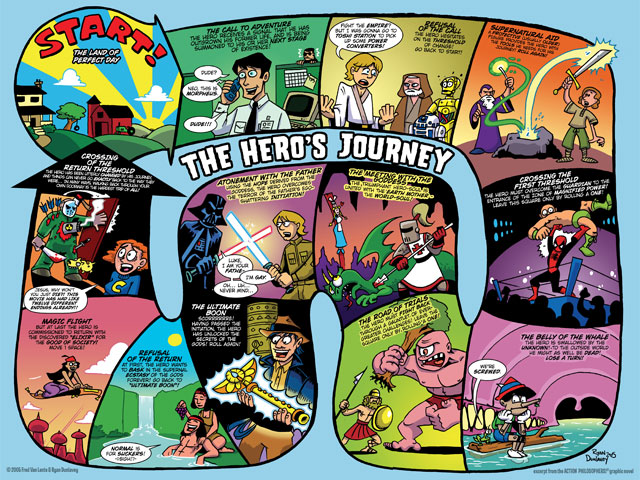
Doesn't the guy in the first panel kinda look like Jack? Think about it.
This is true in most TV shows, too. Although most series seem to be ensemble stories, in the end most are really only about the actions taken by a single protagonist. House, for example, has a large-ish cast, but it is really only about House and what House does. The original version of Scrubs had a huge cast, but in the end it was really only about the heroic quest of J.D. The Simpsons is an interesting but still similar example: It has a quadrillion characters in it, but each A-story or B-story tends to be only about a single protagonist. This protagonist (usually Homer, Bart, or Lisa, although sometimes it’s Marge, Krusty, or Flanders) both creates the problem that starts the plot and solves the problem at the end of the episode. (This is the case in most scripted comedies.)
What we’re seeing in most American TV shows, movies, and books, is the continual reiteration of a single idea: Certain people are more special than others. These people are called “protagonists.” They are special because they control their plots, they wear plot armor, and they are each the smartest or strongest or most charismatic or wackiest person in their entire fictional universe. They are the ones who lessons at the end of the story. They are the ones we, the audience, should be paying attention to.
We Americans like this unspoken lesson. Most Americans—heck, maybe most humans—like to believe that each of us is special, the star of our own life stories. We also like to believe that our actions have direct consequences, good or bad, on the outcomes of our lives. This belief can be good (“I’m rich because I worked hard!”), or it can be bad (“I got cancer because I was mean to a homeless person”). Either way, it’s certainly a major component of the American Dream. A TV show that undermines this belief in our ability to control our own life stories is sure to be controversial.
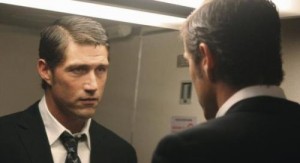
"Special" protagonist or random schlub?
You can probably see where I’m going with this. Is this true of Lost? Are certain characters—the protagonists, particularly Jack and Locke—“special”? Are they heroes in a heroic quest, who, in the last episode, will make a big decision that will save the world? Or are they tragic heroes preparing to make a noble sacrifice? Or is Lost a Shakespearean tragedy where the protagonists will meet tragic fates due to their own mistakes and fatal flaws?
Or is Lost following a different paradigm entirely? Could Lost be a show about fate, after all? Could it be a show about characters who are not proactive protagonists but passive pawns? Could it truly be a show about non-special characters whose actions have little to no effect on the ultimate outcome of the tale?
Let’s look at the evidence:
Lost’s Characters Are Special, Dammit!
- The show has been using the word “special” over and over since the first episode. That does suggest that, some characters, at least, are special in some way.
- The flashback device used in the first and second season seems appropriate for a show about “special” characters. It’s like the show is saying: Look! These individuals are each so special we have to write entire episodes of backstory for them so you can see how unique and interesting each of them is.
- Since the beginning, Lost has focused on Jack as the “main character.” If it turns out he was just on the Island randomly, that he and his father are not special or important in any way… well, that would be a huge fake out. Anyway, Jack has had some major control over his destiny over the course of the series: he did lead the Losties throughout most of the show, which did alter the course of the plot, and he was just the pivotal leader of the “let’s blow up Jughead and bring about a new timeline” plot of season five.
- If certain characters, like the perpetually shat-upon John Locke, turn out NOT to be special, that’ll be really, really disappointing.
Lost’s Characters Are Not Special, Dammit!
- If certain characters are more special than others, then the motto “Live together, die alone” doesn’t really work. Then it becomes, “If we stick together, the important characters will live at the end of the show, but the less special characters will die alone.” Wait, this is already true — remember the flaming arrow attack?
- The four-dimensional chess games Jacob and his black shirt-wearing amigo are playing seem to prove that the Losties AREN’T completely in control of their own destinies. The show, at this point, seems to be acting more like a myth (in which the mortal characters are controlled by immortal forces) than a fantasy/romance (in which it is narratively stipulated that the heroes must save the day on their own).
- Hey, remember how the ENTIRE last season was about how people’s lives are controlled by fate, not by individual choices? (“Whatever happened, happened!”) You can, in fact, make a good argument that the only characters who had any free will in the fifth season were Jacob, the Man in Black, Jack, and Juliet–and Jack and Juliet only used their free will in the last episode of the season.
- It’s unclear at this point, of course, but there is some suggestion that the Losties in Universe A (the regular Island world of 2007) are indirectly affecting the lives of the Losties in Universe 1 (a.k.a. Bizarro LA X Lost), and vice-versa. If this is the case (and I’m betting it is, somehow), then the characters in both universes will STILL have nearly no control over how their own stories end.
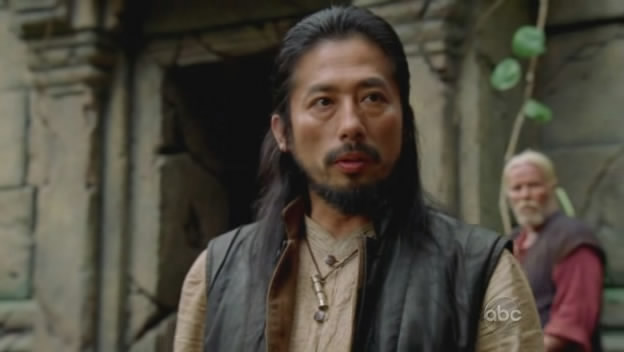
"Watashi wa 'special' desu."
If I had to guess, I would guess the Lost IS a heroic quest story, and that free will will win the day. Jack will be the hero (as will goodLocke and Sawyer and Kate), and the end of the series will be influenced by the human characters’ own free actions. After all, this show IS American and on network TV.
But what if? What if this isn’t how the show ends? What if, by chance, it turns out that ALL of the main characters besides Jacob and the MiB were really just pawns of the gods and Lost’s writers? What if it turned out that fate was real the whole time? What if no one was special?
Well, we’d all probably be pretty disappointed, honestly. But maybe we shouldn’t be. After all, there are plenty of great TV shows, books, and movies that aren’t about proactive, effectual protagonists. For example:
Arrested Development: This satirical farce is about a hero (Michael Bluth) who is reactive, not proactive, and who rarely is able to solve his or his family’s problems. This is amusing to us.
The Wire: Although each individual character in this show is proactive, no one ever has true control over his or her own destiny. The course of characters’ lives (and deaths) are determined more by the ineffectiveness or rigidity of various institutions, such as the Baltimore police department, the government, or the local drug syndicate, than by any individual actions any individual characters take. And yet, most TV critics consider this to be one of the best shows of all time.
Friday Night Lights: Again, though many FNL characters work to change their destinies, their actions and choices aren’t as powerful as their socioeconomic classes, influential local institutions, and the inexorable (and nearly magical) gravitational pull of the sinkhole they call Dillon, TX. The most recently aired episode of this current season (episode 4.12), in fact, was so grimly fatalistic that almost none of the characters had any control over anything that occurred in the episode. Of course, everyone loved it.
So there are clearly good TV shows about ineffectual protagonists out there. Is Lost one of them?
I don’t know. Lost is not a farce, it’s not a satire, and it’s not some grim, hyper-realistic look at what it means to be poor in Baltimore or Dillon, Texas. It’s a fantasy, and fantasies should end with a big climax brought about by the stories’ heroes.
…Shouldn’t they?
[How do you think will Lost end–with a bang or a whimper? Will Jack and the other Losties save the day, or will the end of the show be a Jacob-ex-machina? I’d like to hear your thoughts below in the comment section.]
Other random thoughts about episode 6.1: LA X
- Forget Juliet; Locke was the one who was making me want to cry this whole episode. From the way he lied (I think) about his Walkabout to the revelation that his last thought was “I don’t understand…” Oh, and his talk with Jack at the end? Sorry…I’m gonna get a tissue.
- Is “nothing’s irreversible” going to be this season’s “whatever happened, happened”?
- Can we start calling the Temple resurrection pool “the magical hot tub”? How does that thing work, anyway?
- When the MiB said that he was “very disappointed” at the end of the episode, was he talking specifically about Richard, the Others, or humanity in general?
- When did Hurley start seeing dead people, anyway? Does that mean Dave, the man who lived in Hurley’s imagination, was really a ghost all along?
- Heh, Smokey sure is smart. Way to die, Bram. Didn’t think about the third dimension, did you?
- Why was I so gleeful when I saw Arzt and Frogurt? Those two make my day. Seeing Boone was neat, too.
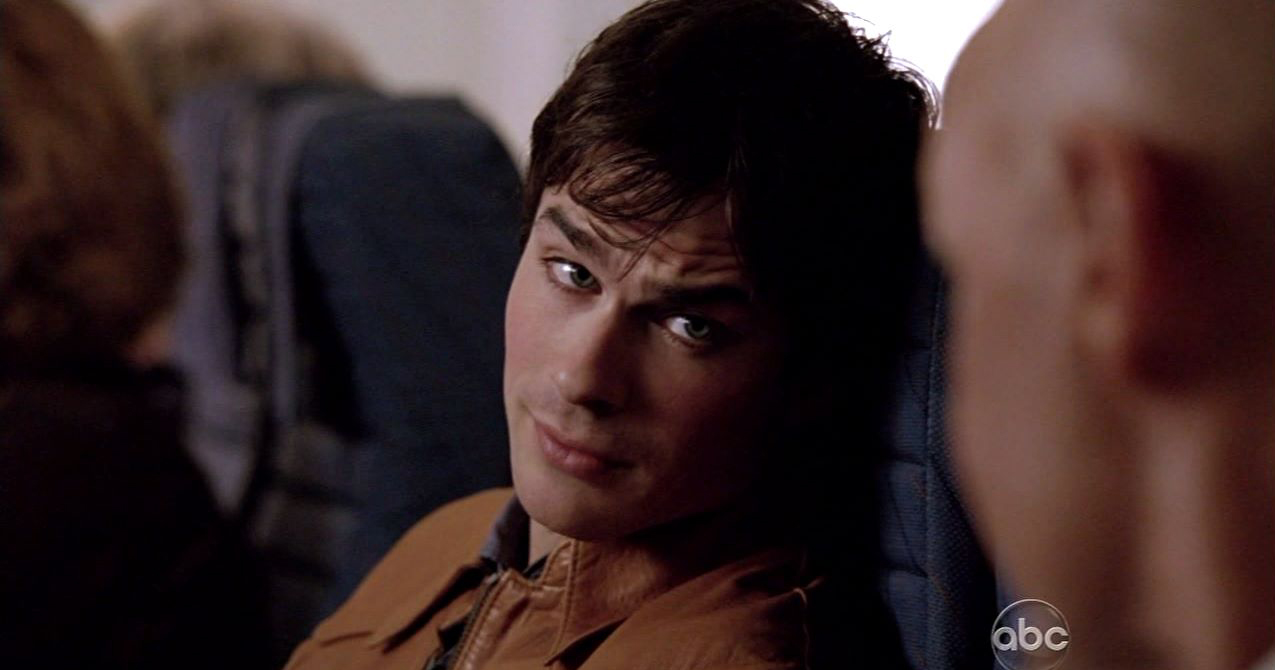
Boone, on the last "leg" of his journey. Get it? Oh, the irony!
Other Theories
Obviously the “real” timeline and the “bizarro” timeline have to cross over at some point–but how will the writers do it? The way I see it, there are only four good solutions:
- “Whatever happened, happened” – This means that whatever happens in one universe will eventually happen in the other universe. That means Charlie’s gonna die (again), alive!Locke’s gonna walk, Bizarro Jack’s going to scream “We have to go back!” even though technically he’s never been to the Island before.
- “Bring balance to the Force” – In this scenario, there can only be one version of each character at any given time. Thus, one Kate (either 2007-Kate or 2003-Kate) is going to have to die somehow. Bizarro Charlie can live, because Regular Charlie’s already dead. Everything balances out in the end.
- “Two timelines enter, one timeline leaves” – In this scenario, one entire universe will sacrifice itself for the other. For example, the 2007-Losties find out that there is a paradox and that one timeline needs to die OR ELSE. Jack & co. sacrifice themselves and their timeline to save themselves in the new alternate timeline. This is sad. If I were a betting woman, I’d bet on this ending.
- “Mirror, Mirror” – In my favorite scenario, the duplicates somehow meet each other in one timeline or the other, as in the Bizarro episode of Sealab 2021, the multiple universes episode of Futurama, or the sexier, beard-ier episodes of Star Trek. The final, climactic battle sees good!Locke destroying evil!Locke/MiB.
[P.S. – Hey, no spoilers in the comments, ok? If you know anything about the rest of season six, keep it to yourself!]
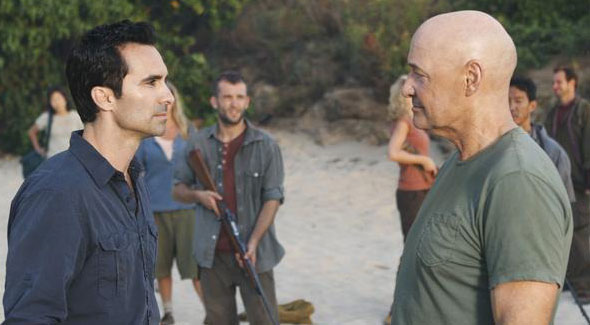
Excellent read, as always! If you haven’t already, I strongly recommend listening to the official Lost audio podcast with Damon and Carlton – I think you’ll find their points about avoiding entirely the use of words such as “alt”, “real” and “bizarro” interesting.
I love that fact that now we only have to wait 7 days at a time until LOST instead of 9 months. It makes the weeks just fly by.
Im feeling a somewhat similar outcome to your third possibilitiy, Mlawski. After the first couple of seasons with how much they built Walt up, hes going to have to reappaear and play a role at some point. Im thinkin bizzaro Walt tells bizzaro Jack something cryptic like “This isnt right” or “We shouldnt be here”, and that continues bizzaro Jack slipping more and more into his curious feeling that he is obviously experiencing…
Lost seems to enjoy characters reading the future, so I imagine that some sort of future-telling will push bizzaro jack (or maybe bizzaro locke; he and walt were pals before..) to do something crazy. The scenario im picturing plays out like this-
Bizzaro Walt appears to Bizzaro Jack- “This isnt right, Jack”
Bizzaro Jack- “Do I know you”
BW- We shouldnt be here
BJ- Shouldnt be where, what are you talking about
BW- Go with Claire, shes your sister. And aaron is your nephew
BJ- Whaaaa?
BW- {Disappears}
Then obviously at some point he crosses paths with bizzaro claire and kate and things start getting really nuts….
Or Sayyid is Jesus and Evil Locke is the Devil (“Im disappointed in all of you” WAS to humanity) and the final season is a literal war between the two, taking place on the island (which is now no longer on Earth or any other physical plane) and the consequences are felt and shown in bizzaro world, which is now the “Real World”.
I just don’t think there’s any way they can possibly bring back Walt as a character, at least in the alt-universe… and even the three-years-later “present” is stretching things. What would be fantastic is if they had the foresight to shoot a scene or two of Walt back in 2004 that they could use now… but let’s be honest, there’s no way that happened. (I DO wonder if there are any deleted scenes of Walt they could use… hell, with a little digital FX magic, they could comp young Walt into the alt-universe!)
re: Hurley and Dave — I get the sense that Hurley only developed his talent after leaving the island the first time. When he and Miles have talked to the dead on Lost, typically the dead aren’t cryptic at all — they usually start by saying something like “Yep, I’m not really here. I died.” Dave was, if anything, a manifestation of the island, though who knows why. Possibly to get Hurley to think he had lost his mind? To get him to kill himself? Who knows.
(Also, on that note: isn’t it interesting, now that I think of it, that Smokey CANNOT take the form of anyone who’s living? Whether it’s Christian (IF he’s been Christian, and I doubt it), Yemi, Kate’s horse, whatever — they’ve all been dead. Smokey can’t just turn into Locke — Locke has to be dead first. Interesting… probably one of “the rules” that Jacob and MiB mentioned in their talk in the S5 finale…)
Obviously the “real” timeline and the “bizarro” timeline have to cross over at some point–but how will the writers do it?
I think Desmond’s apparent vanishing from the plane is a foreshadowing of how they deal with the eventual merging of the timelines. There’s no other reason to show Desmond on the plane and then make a big deal about him suddenly being gone. Maybe at a certain point in the changed timeline they just pop to where they’re supposed to be when they get off the island? I don’t know.
I still feel stupid for thinking there were three timelines before, but I’d still like to suggest the show is kind of a mixture of free-will v. fate, as in fate will take the characters so far, but they’ll have to make choices that impact where next fate will take them. So yeah, they may figure out something’s rotten in the state of The Island, but what they do with that information, whether they sear or not, will be up to them.
Re: Walt- I think Walt and everything about him was probably the worst-handled nugget so far. Part of me hopes he comes back if only to make his presence have more of a point overall. But part of me would rather he just stay gone. As he stands, the only good his existence on the Island has served was as a motivation for other characters to Do Things, as a plot device in itself and not as a character with independent thoughts and actions and growth to experience (HMMMMMMMMM).
The Magic Hot Tub seems to me to be linked to Jacob’s life- not existence, but life. The leader of the Temple people tested his hand as if he wasn’t sure it would work after hearing Jacob is dead, after all- and it didn’t work, his hand didn’t heal. If he was certain of its capabilities, he wouldn’t have tested it that way, nor would he have warned Jack and the rest so adamantly that there would be “risk” involved in sticking Sayid in there. Maybe it’s alluding to how Jacob and MiB are going to end up being some sort of Yin and Yang-type unit? What if, in the end, they either destroy each other or merge into one? Sort of like the Bring Balance to the Force deal, I suppose, except acted out through opposing forces instead of alternate timelines. I can see MiB wanting to get rid of Jacob in order to have dominance and Jacob wanting to get rid of MiB in order to regain stability for the universe (or wherever the bloody show takes place, anyway).
*swear
I really hope that the protagonists are special and that, as Locke promised so long ago, that they “were all brought there for a reason”. Whether the reason was to blow up the Swan and everything else is an afterstory, whatever. But if any group of saps on a plane could have been sucked down onto the Island, than that’ll be sad indeed.
And, let’s call the “LA X” universe “Universe B”. You know, it’s just got more of a B feel to it.
My (non-Lost-viewing) prediction for the finale is a St. Elsewhere/Newhart “It was all in a possibly unrelated character” because, for all I’ve heard, that seems to be the only way to resolve any of this.
Now, before you start wondering why someone who doesn’t watch Lost was reading an analysis of the first episode, realize that this is the only place on the internet for a coherent explanation of the series. This is my best hope for understanding it without spending a week and a buttload of money actually watching Lost.
Greg – how pointless! Why even bother reading analysis without watching the thing? A week is a tiny investment of your time and, well, we’re all on the internet so is money really a concern? Plus, as Mlawski’s recaps have shown, it’s really, really worth it. To me, it’s like reading an essay on a novel without reading the novel – everything you’re experiencing is second hand. Stop living vicariously, man!
Also – “My (non-Lost-viewing) prediction for the finale is a St. Elsewhere/Newhart “It was all in a possibly unrelated character” because, for all I’ve heard, that seems to be the only way to resolve any of this.” is, by definition, entirely uninformed. Basically, in the nicest way possible (and I’m really not trying to be a dick), this post was pointless. Sorry.
I’m on the side of “special” regarding our Losties.
One non-theorizing note on the bizarro timeline: all the actors playing the Losties are getting a great chance to show off their acting chops by portraying the same character at different stages in their development- Terry O’Quinn is a bitter cripple AND the MiB, Josh Holloway is an immature con and a grieving husband, Matthew Fox is a doctor with daddy issues and a man trying to figure out his destiny, and so on. All except Kate, that is. She hasn’t change a [swear word] bit since the first episode. This just makes me hate her even more.
Hahaha, I suppose, but Kate did have the chance to be protective mother… But not for long.
@mlawski:
One of your arguments that the Losties are all “special” is as follows:
The flashback device used in the first and second season seems appropriate for a show about “special” characters. It’s like the show is saying: Look! These individuals are each so special we have to write entire episodes of backstory for them so you can see how unique and interesting each of them is.
I strongly disagree with that statement, actually, and in fact, I think it’s a pretty good argument that they’re not all special. You could have had an intricate flashback device with even the most mundane of characters in a situation like this. In fact, that’s the quality about Lost that drove me to it – the way that each character used this crisis in his or her life to reflect on a lesson learned from a similar crisis in their past life. I don’t think it implies any “specialness” on the part of our heroes. (Also, I think losing touch with this device has made the show get less appealing as time goes on. But who am I to complain? I’m still watching.)
@Kevin,
I don’t know, as soon as newLocke/Smokey said “I’m sorry you had to see me like that,” it seemed obvious to me that he was also, in fact, every dead character we’ve ever seen walking around – including and especially Christian. Can anyone convince me why that wouldn’t be so?
Finally, @no one in particular:
I liveblogged the season premiere last week. If you’re interested, you can read it here. Obviously, there will be spoilers. http://www.jon-eric.com/blog/2010/02/liveblogging-lost.php
@Jon Eric: oh, I think Smokey has *probably* been every spirit character… what makes me wonder about Christian is that he’s usually *useful* as a spirit. Not only that, but typically a character will see Smokey as someone from their past… and yet, “Christian” has appeared to a number of characters, without any explanation that he’s Jack’s father (think of Ben, Sun, Lapidus, Locke, etc.). There’s no sense that he’s judging them and may shortly turn into Smokey to pass judgment — consider his appearance to Eko as Yemi in S3, and to Ben as his daughter in S5. It’s almost as if “Christian” is the Dave Bowman of Lost, if you will — he’s “evolved” to a higher plane and gives advice without ever actually helping outright.
Also, I’ve never thought it possible that Smokey could manifest as two (or more) different characters at the same time — remember, “Locke” isn’t around when Ben goes to be judged and sees his daughter, for example; when she goes away, “Locke” comes back. But in S5, when Sun and Lapidus are in New Otherton with “Christian”… doesn’t “Locke” call to them from outside? (I can’t remember now, will have to break out the DVD now! That might be wrong, come to think of it)
While I wonder if he’s the manifestation of Smokey… I don’t necessarily think he is Jacob, either. If anything, he really does seem like the true “spirit” of the island. I don’t know… “Christian” always seems like a good guy, as if he’s trying to inspire whoever he’s with on to better things. (And not necessarily the MiB’s agenda…)
Really, I just think the odd thing about it is that for all MiB/Smokey’s limitless power… he can’t, say, take the form of Sawyer while Kate’s on the other side of the island — it’s only the dead. (Then again, you can sprinkle a ring of ash to keep Smokey out — how powerful is THAT??!!) I think part of the explanation will happen as part of the Claire-followup in 2007, when they explain whether or not she died in the mercenary attack. It’ll probably involve Miles as well, since he can read the thoughts of the dead… he’s already shown quite an interest in Claire post-attack, as if he knows she’s a zombie/MiB/spirit.
@Kevin, regarding Christian: I think MiB/Smokey almost exclusively used Christian for the longest time, and for several characters, because for a while Christian was the only (relevant) dead character. When they crashed, Christian was in the casket on the plane. As more characters have died, MiB/Smokey’s been able to increase his repertoire (i.e. assuming Alex after she’d been shot to influence Ben, Locke to influence everyone after Ben had strangled him). He assumes the most effective personage for each character he tries to influence.
Now that he has Locke, we probably won’t see Christian unless he needs him to swing Jack some way. (Kind of like the basic weapon of a video game, useful on the first levels, but as you progress you forget it- until its needed for some specific purpose).
@BWNNN: I mostly agree… but again, lots of times “Christian” has shown up just to make ghostly appearances to Jack, or to give guidance (to Sun and Lapidus in S5, for example). I agree that Smokey appears in other forms in order to influence people… but “Christian” doesn’t always seem consistent in that regard. Sometimes he tells people what to do (Locke and the frozen donkey wheel); others he chats with but is content just to hang out (Sun & Lapidus); and other times he just appears in the distance, only to vanish moments later (Jack).
Also, when Kate saw the horse from her past — I believe the powers-that-be on the show have said that was an island manifestation. If so, I assume it’s Smokey. But why? Even if it’s not Smokey… again, why?
(My sense is that as the show has progressed, just what the “spirits” are has evolved over time; I’m fine with that, but am starting to wonder a) why Smokey can only appear as someone who’s dead, and b) if Smokey is the only entity who’s able to do this trick… or if some of the appearances have actually been Jacob (i.e., Kate’s horse).
they can bring back walt.. as jacob!!
just like the other man is locke, jacob would be walt! This may overcome the writers concerns about his age since its jacob, you know. It can also show why the others wanted walt so badly and thought he was special!!
Also a showdown at the end between locke and walt, about the bright and dark since they discussed this in season 1, is a perfect idea to bring those two together firstly to explay what locke meant by the stones and have a showdown between them,,
I should be a writer man, and if this happens then lost will be the best show that ever and will ever come in history
I’m thinking there’s a fifth possibilty for the two timelines. My theory is that the “LA X” timeline is essentially an extended epilogue. It’s not a ‘flash to the side’ showing us a parallel universe, it’s a flashforward showing us the new timeline that will be eventually born from the ultimate showdown with Smokey on the Island.
I realize it’s weeks past this post now but I just read it and have to tell you that you should watch the show Supernatural for at least the following two reasons:
1) Mark Pellegrino (Lost’s Jacob) plays Lucifer. How can anyone not want to watch that?
2) The show is in the middle of a big fate vs. free will storyline. The main characters have actually been told at this point that there is no free will, everything is predestined, and they are and always have been pawns. Obviously the satisfying story would be to see the heroes exercise free will to “save the day”, but try as they might, at every turn so far they haven’t managed to do anything but what they’re fated to do. It’s very interesting stuff.
@lauren: Thanks for the suggestion! I keep hearing that Supernatural is getting better and better, so maybe I’ll put it on my “to watch (eventually)” list. Unfortunately, that list is miles long now, but one day…